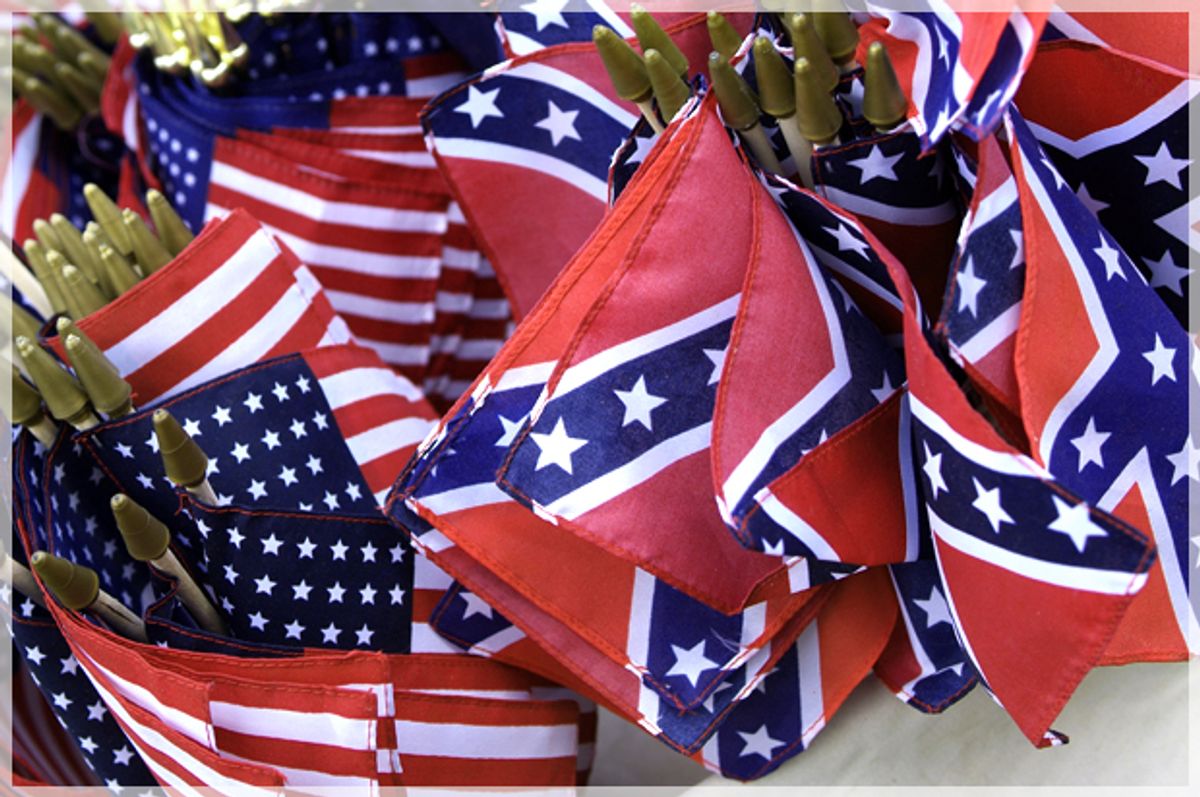 A new survey by the Southern Poverty Law Center catalogs more than 1,500 public monuments, statues, schools, cities and military bases in southern communities and across the United States that continue to honor the Confederacy.
A new survey by the Southern Poverty Law Center catalogs more than 1,500 public monuments, statues, schools, cities and military bases in southern communities and across the United States that continue to honor the Confederacy.
Tensions between those who support symbols of the Confederacy as heritage and those who view them as emblematic of racism and oppression is nothing new, but the battle has become more mainstream in recent years. While some protesters have successfully rallied to remove pro-Confederacy monuments from public spaces, one need only visit a Trump rally to find T-shirts, hats and other collectibles brandishing vestigial tokens of the racist South.
Many brand attempts at removing these representations as examples of political correctness, arguing we are trying to rewrite history. But as the SPLC points out, “this is not an attempt to erase history. It is an effort to end the government’s endorsement of a symbol that has always represented the oppression of an entire race.”
Here are five government-endorsed ways the Confederacy is still being honored.
1. Public Schools
The SPLC identified at least 109 public schools named after Confederate leaders such as Robert E. Lee, Stonewall Jackson and Jefferson Davis.

Robert E. Lee High School, Jacksonville, Florida (image: Subwayatrain/Wikipedia)
“Of the 109 schools, 27 have student populations that are majority African American, and 10 have African American populations of over 90 percent,” the SPLC writes. The center notes many of these schools were built during the modern civil rights movement.
2. Monuments and Statues
Of the 718 monuments on public spaces throughout the Unites States, the majority were dedicated prior to 1950, though at least 32 were dedicated or rededicated after 2000. The majority of the monuments are in Southern states, with Virginia, Georgia, and North Carolina laying claim to most Confederate symbols.

General P.G.T. Beauregard Equestrian Statue in New Orleans by sculptor Alexander Doyle (image: Infrogmation/Wikipedia)
The survey notes that while most memorials “honor the heroism and valor,” some “glorify the Confederacy’s cause.” One South Carolina monument, erected in 1902, reads, “The world shall yet decide, in truth’s clear, far-off light, that the soldiers who wore the gray, and died with Lee, were in the right.”
3. Military Bases
Ten U.S. military bases in six states honor Confederate leaders, including General P.G.T. Beauregard, General Edmund Rucker and General Braxton Bragg.

Barracks of the 1st Brigade, 82nd Airborne Division at Fort Bragg (image: Jonas N. Jordan, U.S. Army Corps of Engineers, U.S. Army Corps of Engineers Digital Visual Library/Wikipedia)
4. Official Holidays or Observances
Six southern states observe holidays or observances that honor the Confederacy, the SPLC reports. In Alabama and Mississippi, state employees take off work for two Confederacy-related holidays.
5. The Confederate Flag
While South Carolina and Alabama passed laws to remove the Confederate flag in the wake of last year’s mass shooting at Emanuel African Methodist Episcopal Church in Charleston, South Carolina, SPLC found six former Confederate states that still fly or represent the Confederate flag.
The survey notes that Mississippi “conspicuously incorporates the Confederate battle sign into its design.” And despite joining South Carolina in removing the Confederate flag from its capitol grounds, Alabama still adorns the uniforms of its state troopers with “a likeness of the flag.”

Alabama Highway Patrol logo (image: Wikipedia)
Honoring the Confederacy under the guise of celebrating American heritage is an unconvincing argument. As historian Juan Cole wrote days after the 2015 massacre in Charleston:
Those who fought beneath the Confederate flag were fighting to retain slavery. They wanted an economic system in which they could kidnap people from Africa and coerce them into working for no salary. Any individual found kidnapping people today and coercing their labor for no remuneration would go straight to jail. So why should the flag symbolizing these activities be retained?



Shares